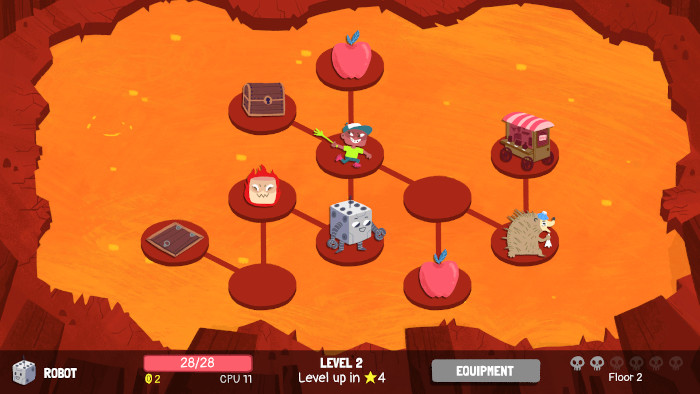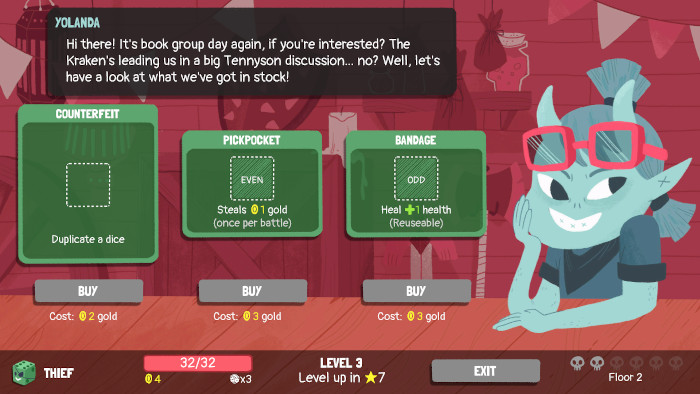Dicey Dungeons
Reviews
Please sign in or register to add your own review.
What if you took some of the best ideas from the roguelike deck-building genre, but instead of being dealt cards, you rolled dice on each turn? That’s the premise of a ridiculous, addictive, and sometimes frustrating game called Dicey Dungeons.
Developer Terry Cavanagh has published indie games since at least 2008, but his breakthrough titles were the puzzle platformer VVVVVV (2010) and the brilliant twitch game Super Hexagon (2012).
When I first looked at Dicey Dungeons, I was not especially enamored. Anthropomorphized dice, really? The moment you start actually playing it, the game’s self-aware sense of humor makes it all work.
You play as the contestant in a gameshow whose host, Lady Luck, promises to fulfill your innermost desires if you win. The catch? You’re transformed into a dice and are doomed to compete in Lady Lucks’s dungeons forever, with the game clearly rigged against you.
Revenge of the bloodsucking vacuum cleaners

The maps are the least interesting part of the game, but they do show you all the enemies you can fight in a given level. In this case, you can go up against a marshmallow, a coin-stealing kid, and a sickly hedgehog. (Credit: Terry Cavanagh. Fair use.)
The enemies you encounter are not the standard fantasy fare. Instead, your next opponent could be a bloodsucking vacuum cleaner, a snowball-throwing yeti, a poisonous ice cream cone, or a guy whose entire head is a home stereo system.
Battles are turn-based. On each turn, you roll a number of dice, which you then drag and drop to a compatible item in your inventory. You may not have one! For example, all your items might require even numbers, and you might roll a bunch of threes.
It’s a simple enough concept, but with a large variety of enemies and items, it adds up to a rich gameplay experience. By itself, that could make for a 5-10 hour game. What makes Dicey Dungeons a 30-60 hour game is its willingness to throw its own rules by the wayside.
Rules, schmules
As you play the game, you unlock new characters with their own sets of items, and with completely different play styles. For example:
-
a character that casts spells from a spellbook with a fixed number of slots, of which up to four can be active at any given time.
-
a character that, instead of rolling dice, generates random numbers towards a fixed target value. If you hit that target value exactly, you get a jackpot reward.
-
a character that is dealt a set of cards in random order, combining true deckbuilding mechanics with dice.
Moreover, each character advances through six episodes that play with rules in interesting ways. The most interesting of these are the “parallel universe” episodes (in which items and status effects work completely differently) and the bonus episodes (in which you gradually accumulate randomized rules like “after 4 turns, all enemies transform into bears”).
It all culminates in a final confrontation which, again, does something completely new and interesting with the game mechanics. I won’t spoil it for you; suffice it to say that there’s a lot to keep the player engaged. And when you’re done with that, there are some (fairly easy) Halloween bonus episodes as well.
As with Super Hexagon, Cavanagh again collaborated with Chipzel on the music. Unlike the high octane chiptune sound of Super Hexagon, Dicey Dungeons’ soundtrack blends in jazzy flavors, which give the game a unique feel.

The game’s wit and humor come through in many places, such as when visiting shops. Sometimes the shopkeepers will even remark on specific enemies in the level you’re in. (Credit: Terry Cavanagh. Fair use.)
Dice with rough edges
The game is not perfect. My criticisms of it can be summed up in three categories:
-
Pointless maps: The game features suitably atmospheric levels such as “the libary” or “the dark forest”. But the actual dungeon maps are extremely linear and basic. The most complex choices you’ll make navigating the dungeon are branching questions: This enemy first, or that one?
-
Luck over strategy: Being at its heart a dice game, Dicey Dungeons can be incredibly unfair. An enemy can roll two sixes twice in a row, hitting you with maximum damage and status effects, while you are barely able to make a dent due to a poor roll.
In theory, you can sometimes flee a battle. But that action is almost useless. You’ll still have all your damage, and in many cases you won’t progress unless you defeat the enemy. So, go against the same enemy again with three hit points left, while they’re back at full strength? Good luck! -
Inconsistent execution quality. The spellbook user experience, for example, is very clunky—the drag and drop mechanics are poorly explained and not intuitive. Even though the mechanic had promise, I had the least fun playing that character, just due to the interface feeling so unpolished.
Each character’s list of episodes includes an “elimination round” which, as the name suggests, exists to prevent straightforward progression. It achieves this by making the enemies’ items a lot more powerful. Unfortunately, this can lead to a high number of unwinnable encounters.
The Verdict
Those criticisms shouldn’t distract from the fact that Dicey Dungeons, overall, is a hell of a lot of fun to play. There’s a lot of love in the details, from the silly unlockable enemy biographies, to the clever dialogue during encounters or shopkeeper visits.
I would give the game 4.5 stars, rounded up because of the sheer amount of gameplay variety and content. If you enjoy the deckbuilding formula, and are looking for something similar that may keep you entertained for a few weekends, go and roll those dice—you might get lucky!
About
-
Online stores itch.io GOG.com Steam - 2019 video game
-
Show uploaded media
Uploaded media:
dicey2-1646896610012.jpg
The game's wit and humor come through in many places, such as when visiting shops. Sometimes the shopkeepers will even remark on specific enemies in the level you're in.Credit: Terry Cavanagh. Fair use.Source: own screenshotdicey1-1646896496816.jpg
The maps are the least interesting part of the game, but they do show you all the enemies you can fight in a given level. In this case, you can go up against a marshmallow, a coin-stealing kid,and a hedgehog.Credit: Terry Cavanagh. Fair use.Source: own screenshotSource data licensing:
Data from Wikidata is available under Creative Commons CC-0.
lib.reviews is only a small part of a larger free culture movement. We are deeply grateful to all who contribute to this movement.